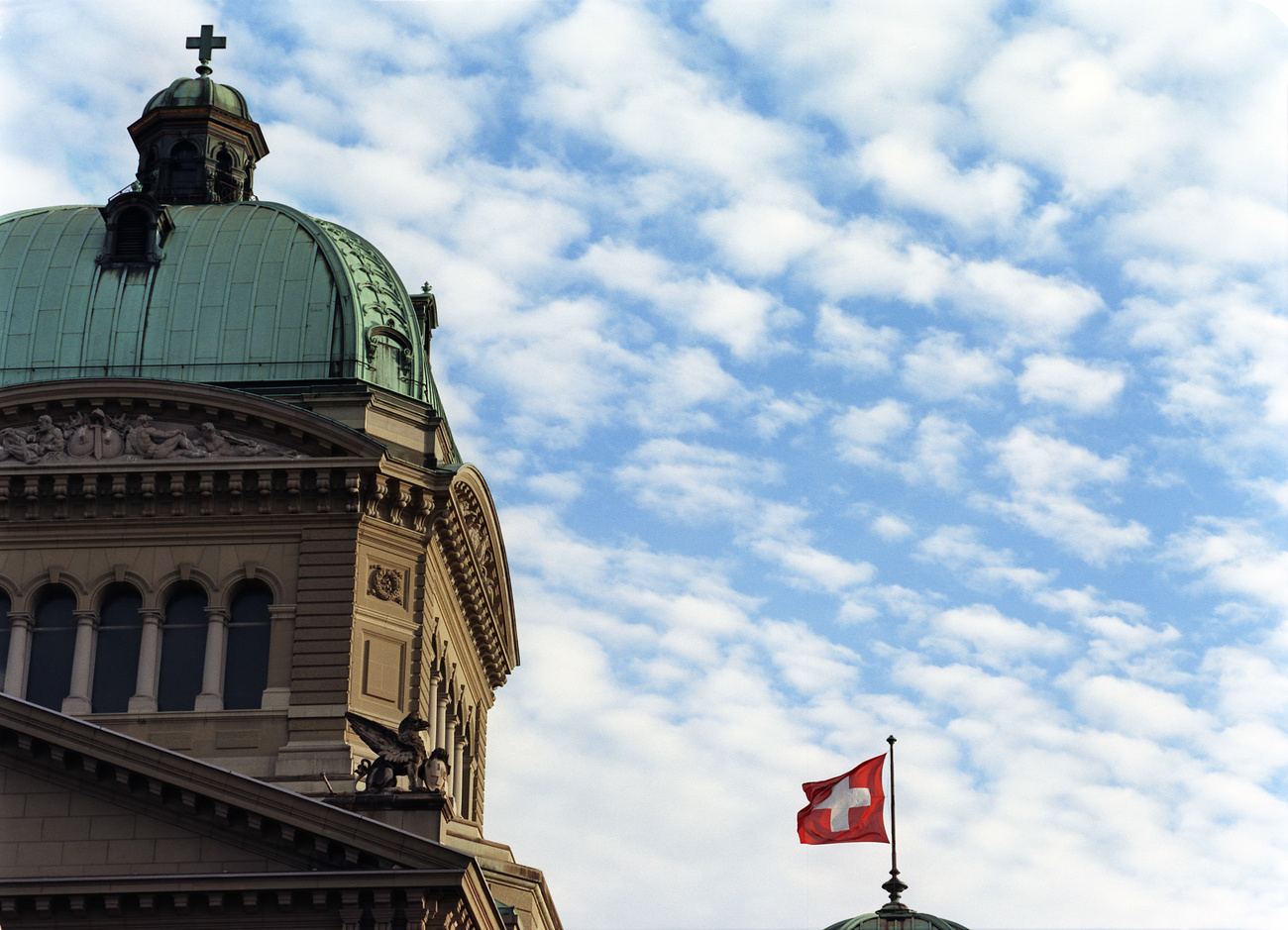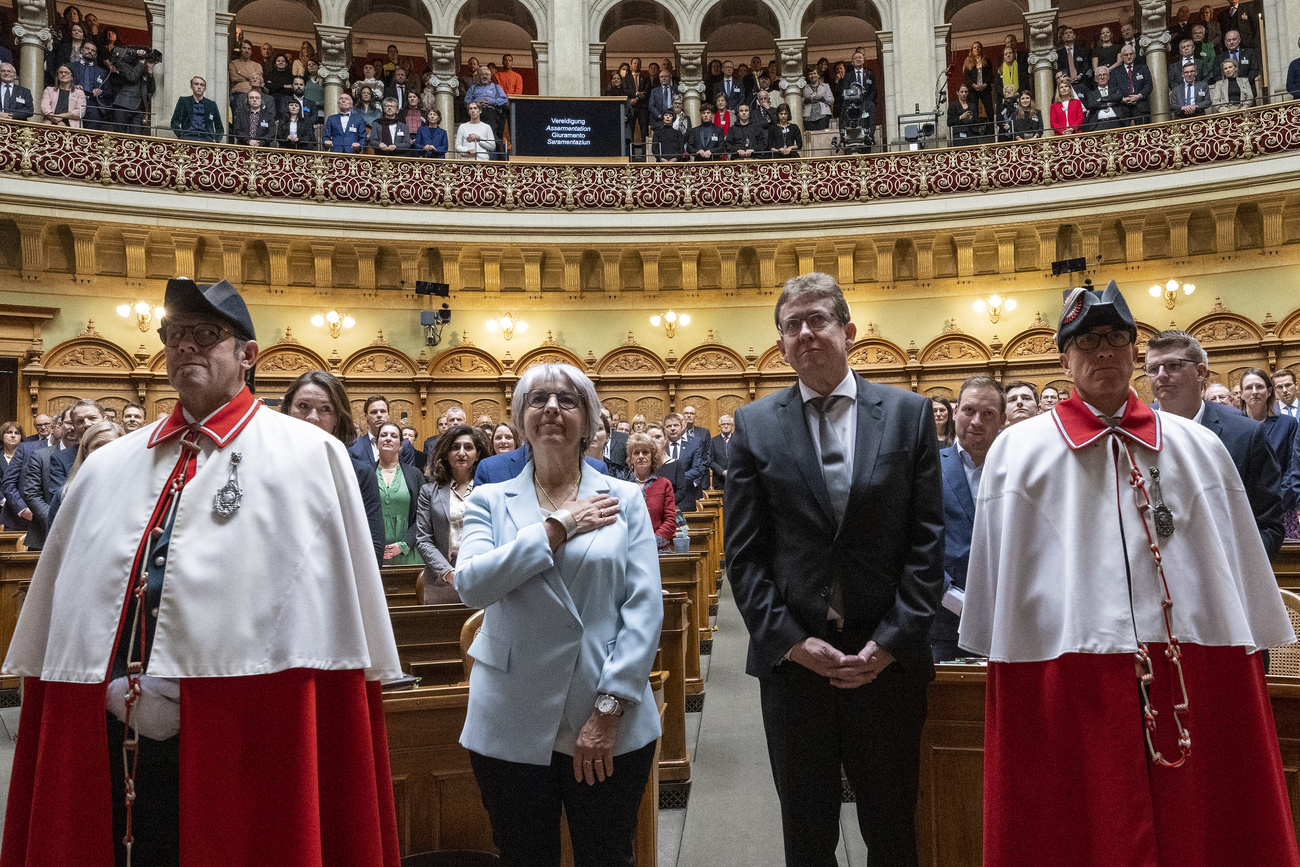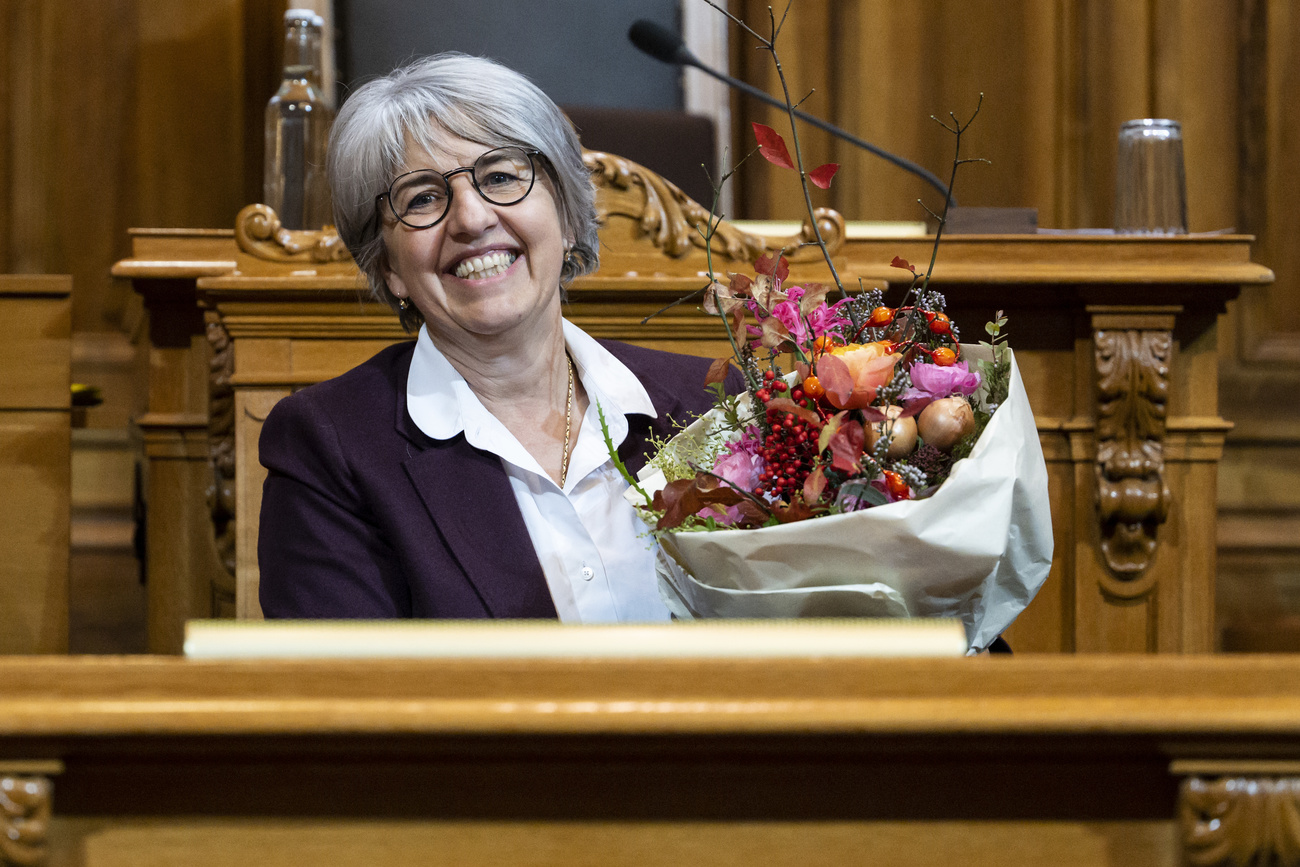What to watch in 2023: the political outlook for Switzerland

An energy minister who is caught between a rock and a hard place; a foreign minister who is expected to salvage Switzerland’s untainted image, and a past squabble that could shake up the federal elections. We take a look at what 2023 has in store for Switzerland.
The federal elections on October 22 will probably be the most significant event in 2023. The first election forecasts by the Swiss Broadcasting Corporation – SWI swissinfo.ch’s parent company – show that not much will change in Swiss politics. At best, the Liberal Green Party and the Radical-Liberal Party could win a few seats in parliament while the Green Party is expected to lose some for its failure to meet its supporters’ expectations. But as most political parties are now focused on the effects of climate change, analysts believe that only left-wingers will still vote for the Green Party.
Despite the waning support for the Green Party, climate change is still high on the list of Swiss voters’ concerns. This is why the first order of business of the new environment minister, Albert Rösti, will be closely watched. As a leading figure in the right-wing Swiss People’s Party and former President of Swiss Oil and the ‘Action for a Sensible Energy Policy Switzerland (AVES)’, Rösti does not quite fit the bill. Climate activists have grumbled about the appointment of the former “oil baron”, calling it a nightmare for climate and environmental protection.
Rösti’s delicate role
In his new position, Rösti is not completely free to do what he wants as he needs the agreement of the other six ministers of the Federal Council. However, he still has a lot of room to manouvre inside his department and set the political agenda. At international climate conferences such as the upcoming COP28 in Dubai, Rösti has to defend Switzerland’s promise to completely ban fossil fuels by 2050. This is a rather tricky task for him as he has caused furore in the past by making anti-climate statements. During the 2019 heatwave, for example, he told his peers not to worry but go out and enjoy the nice weather.
Just like his predecessors, Rösti will learn to withstand the pressure of his own party and prove that he can adopt the ‘principle of collective responsibility’ and act in the interest of the Federal Department of the Environment, Transport, Energy and Communications (DETEC) which he now heads. The first big challenge in his new job will be to openly support the indirect counter-proposal to the Glacier Initiative, which aims to reduce greenhouse gas emissions to “net zero” by 2050. It was adopted by parliament last autumn and heavily criticised by the members of the Swiss People’s Party, who dubbed the proposal “power guzzling”. They have announced a referendum, and if they succeed in collecting the required 50,000 signatures, Rösti will have the difficult task of defending the proposal against the criticism of his party peers. If accepted, the referendum would be the first national referendum in nine months – which for Switzerland is an unusually long period of time without a popular vote.
Troubled foreign affairs
Ignazio Cassis from Ticino will remain at the helm of the foreign affairs ministry which faces some ambivalence. A recent survey conducted by Presence Switzerland in 18 countries showed that even though Switzerland has upheld its positive image abroad and is still highly valued for its landscape, chocolate, watches, financial industry, stable economy and wealth, there are some cracks in its clichéd image. The people and first and foremost the media in other countries have started to view Swiss neutrality more critically. The fact that Switzerland blocked Germany from sending its Swiss-made ammunition to Ukraine was met with international incomprehension, but according to Swiss law, the export of war materials is not allowed if the country of destination is involved in an international armed conflict. Despite repeated explanations, the premises of Switzerland’s policy of neutrality are still not understood.
Apart from struggling to get any diplomatic action done with Russia, and China constantly using its veto power, there’s another challenge ahead. Once Switzerland takes up its non-permanent seat on the UN Security Council on January 1 – the first time in history – Swiss delegates will have to explain Switzerland’s role and neutrality. It will be difficult to accomplish, and comes at a time when Swiss neutrality is also questioned at home. Proposals of what neutrality should look like in the future range from abolition and reform to an initiative by the Swiss People’s Party, which wants to enshrine a clearly defined concept of neutrality in the Swiss constitution. Last year, foreign minister Cassis coined the phrase “cooperative neutrality”, but so far it has remained an empty phrase.
Another phrase that has remained empty so far is ‘package solution’ which is the Federal Council’s latest attempt to ease frozen relations with the EU. After negotiations on an institutional framework agreement stalled in 2021, the relationship between Switzerland and the EU went sour for a while. However, last year saw half a dozen exploratory talks between chief Swiss negotiator Livia Leu and the delegation of the European Commission. The goal of these talks was to set an agenda for a new round of talks by mid-2024, which is when the European elections will take place.
While European Commission Vice President Maros Sefcovic wants to settle the dispute with Switzerland by the end of 2022, Switzerland is no longer in a rush, maybe because past differences between the two have resurfaced. Switzerland sees the ‘package solution’ as an opportunity to regulate the future of the bilateral agreements sector by sector. But the EU wants Switzerland to commit on key institutional issues such as dispute settlement, state aid, wage protection and the free movement of people as it does not want Switzerland to forget about the concessions it made during the talks. One last sticking point: Which court should settle legal disputes that arise from Swiss-EU bilateral relations?
All or nothing for Cassis
For Cassis, who explicitly insisted on remaining the head of the foreign ministry when the departments were reallocated after the Federal Council elections, it is all or nothing. The war in Ukraine has added a new dynamic and closeness to European politics, which is an opportunity Switzerland cannot afford to miss.
The relationship between Switzerland and Germany, home of European Commission President Ursula von der Leyen, has improved – which is clearly reflected in asylum policy. While the growing number of migrants who have arrived in Europe over the past few months have sparked hatred and accusations that Switzerland would just ‘wave the migrants through to other countries’, Germany and Switzerland have adopted a common action plan that aims to combat human smuggling and repatriate labour migrants who move solely for the purpose of employment.
In September 2022, 2,700 asylum applications were submitted in Switzerland, which is the highest number since the refugee crisis in 2015/2016. With the war in Ukraine, the Swiss system has reached its limit, as approximately 70,000 refugees from Ukraine have applied for special refugee status in Switzerland. The rising number of migrants could potentially cause an explosion in domestic politics as it plays right into the hands of the Swiss People’s Party election campaign.
All these are possible scenarios of how there could be significant upheavals in the political structure after all on October 22, 2023.
Translated from German by Billi Bierling

In compliance with the JTI standards
More: SWI swissinfo.ch certified by the Journalism Trust Initiative















You can find an overview of ongoing debates with our journalists here . Please join us!
If you want to start a conversation about a topic raised in this article or want to report factual errors, email us at english@swissinfo.ch.